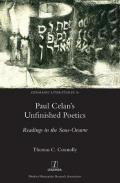Paul Celan (1920-1970) is perhaps the most widely read of modern German-language poets, and yet his reputation has been constructed on a small body of primary texts. Thomas C. Connolly seeks to destabilize canonical readings of Celan’s work by exploring the sous-oeuvre, the marginalized or unauthorized parts of a work that are traditionally eclipsed. These include fragments from Eingedunkelt, a cycle composed during Celan’s incarceration in a psychiatric ward, as well as aphorisms, drafts, press cuttings, reading annotations, a translation of Mallarmé, and poems from the late collections Fadensonnen and Schneepart. Engaging with theories of genetic criticism, theory of law, the history of painting, and Celan’s poetic dialogue with Osip Mandel’shtam, Peter Weiss, and Rembrandt, this study seeks to move discussions of Celan’s poetry onto less familiar ground, and to propose new ways of reading and enjoying literature.
